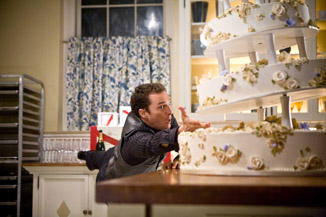Hollywood Psych
By Sean Collier
April 30, 2009
This weekend sees the release of Ghosts of Girlfriends Past, a romantic comedy so standard, so textbook, that it fails even to inspire hatred. This is the place of the standard romcom, now 20 years removed from When Harry Met Sally and Pretty Woman: forgettable fare that'll make quick money and then head for bargain bins and daytime cable repeats, now and forever, world without end, amen.
While watching Ghosts of Girlfriends Past – starring Matthew McConaughey and Jennifer Garner, directed by Mean Girls' Mark Waters – I begrudgingly acknowledged that the premise probably could've gone somewhere. The film basically retells A Christmas Carol as a learning-to-love story. McConaughey is a serial player with a suppressed soft spot for Garner, his late lothario uncle (Michael Douglas, charming) appears to him and warns him of coming ghosts, we see girlfriends past, present and future, yada yada yada. Still, if you came to me (in the utterly preposterous alternate universe wherein I am a high-powered studio exec) and said, "Let's redo Dickens as a date movie," I'd probably put a couple million behind it.
But, as is contractually required of pleasantly fluffy little romances, there's no bite, no peril, not even really any edgy jokes, which are sent away in favor of sight gags and pick-up lines masquerading as clever dialogue. The film progresses as we all knew it would and we all file out into our cars and head home. The next day, we're pretty sure we saw a movie last night, but no one can quite remember what it was.
These films will, without fail, make money. There will, of course, be the rare miss here and there due to a casting misstep or competition at the box office. For the most part, though, take two attractive 30-something pseudo-stars and have them take 90 minutes to realize they love one another, and you'll be counting the profits by the end of opening weekend. Romantic comedy, as a genre, is doing fine from a profit standpoint, and it still manages to satisfy audiences, with relative ease.
We know, however, that romcoms can be more. They can challenge, they can engage us, and they can even show teeth every now and then. The audience can still leave feeling thoroughly heartwarmed if the movie got some dirt under its fingernails. Exhibits A and B, of course, are the tentpoles of the great Apatow-ization of comedy: Knocked Up and The 40 Year-Old Virgin.
Without established stars, Knocked Up effortlessly racked up a $158 million domestic tally in 2007; two years prior, The 40 Year-Old Virgin managed $109 million. These are two of the most successful formula romantic comedies of the decade, and – importantly – they were messy. Knocked Up challenged notions of the standard, organic relationship and frankly and honestly dealt with unexpected pregnancy, the emotional reality of unstable relationships and even abortion. The 40 Year-Old Virgin took the normal romcom structure and stretched it to the breaking point, still ending up more successful and crowd-pleasing than just about anything else we've seen recently.
So dull, obvious romantic comedies make money. Challenging, witty romantic comedies make money. Sometimes vanilla films miss, and sometimes edgy films miss. There's not much risk either way. If I were breaking it down – and, what with all this writing that's going on here, it seems I am – I'd speculate that it's just as likely that a careful, well-made date movie is going to make money as that McConaughey vehicle #404B will. Studios just perceive the more unique films as bigger risks, and tend back towards the center.
It's no crime that the easiest films to pitch and sell are often the ones that get made and marketed. That's just how Hollywood works. It's just a shame that those who control the purse-strings haven't noticed that they've got just as solid of a bet banking on Juno as they do on 27 Dresses. Modern romantic comedies are going to continue to make solid money and put smiles on the faces of the hopefully happy couples in the theater – they just have the option of doing more if they so choose. While I'd like to think that eventually all of these films will be both smart and satisfying, somehow I don't think that Matthew McConaughey needs to doubt his future income.
|
|
|
|




